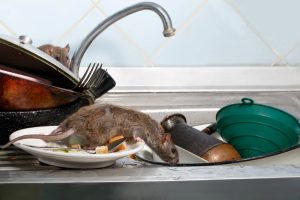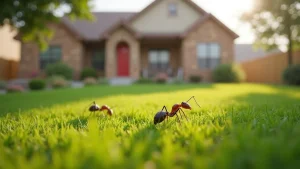Master Seasonal Pest Control in Centennial: Your Ultimate Year-Round Strategy!
Managing pests in your home requires a proactive approach, especially in a place like Centennial. Each season brings its own challenges, from ants and termites in spring to rodents in fall. By following a seasonal checklist, you can effectively keep these nuisances at bay. But what specific steps should you take to ensure your home remains pest-free year-round? Let’s explore the strategies that can make a real difference.
Pest Control Strategies:
- Spring: Seal cracks and inspect for ants and termites; check for food sources to prevent infestations.
- Summer: Eliminate standing water and set up fly traps; use citronella candles outdoors to deter mosquitoes.
- Fall: Seal gaps around entry points and maintain clean kitchens to deter rodents and cockroaches; store food properly.
- Winter: Strengthen insulation, seal entry points, and keep garages dry to prevent winter pests; store firewood away from the home.
- Year-Round: Regularly inspect for pests, clean spills promptly, and maintain ventilation to create a pest-resistant environment in your home.
Spring: Preparing for Ants and Termites

As spring arrives and temperatures rise, you’re likely to see ants and termites emerging from their winter hiding spots.
You might notice ant trails forming in your kitchen or around your home, signaling the start of their active season. To prevent these pests from invading, make sure to seal any cracks in your foundation and windows.
Regularly check for food sources that may attract them, like crumbs or spills. Termites can cause serious damage if left unchecked, so inspect your wooden structures for signs of termite damage, such as frass or hollow-sounding wood.
If you find any signs, act quickly and consider consulting a pest control professional to protect your home from these springtime invaders.
Summer: Guarding Against Mosquitoes and Flies

With warmer weather and longer days, mosquitoes and flies start buzzing around your home, making outdoor activities less enjoyable.
To keep these pests at bay, you need a solid plan. First, eliminate standing water to deter mosquito breeding around your yard. Set up fly traps near entry points to catch any unwelcome guests.
Here’s a quick checklist:
- Remove any debris from your yard
- Clean gutters to prevent water buildup
- Use citronella candles on patios
- Install screens on windows and doors
- Regularly check for and empty any containers holding water
Fall: Preventing Rodents and Cockroaches
As summer fades and temperatures drop, your home becomes an inviting haven for rodents and cockroaches seeking shelter. To prevent these unwelcome guests, start by sealing any cracks or gaps around windows, doors, and foundations.
Rodent behaviors often include gnawing through materials, so use sturdy materials for repairs. Keep your kitchen clean and free of food debris, as this attracts cockroaches. For cockroach prevention, store food in airtight containers and promptly fix any plumbing leaks.
Additionally, declutter your home; clutter provides hiding spots for both pests. Finally, consider setting traps or consulting a pest control professional if you notice signs of infestation. Staying proactive now can save you from bigger problems later.
Winter: Protecting Your Home From Winter Pests
Although winter brings the chill, it also invites pests like spiders, ants, and even termites into your home.
To keep winter pests at bay, focus on strengthening your home insulation and sealing any entry points.
Here’s a quick checklist to help you prepare:
- Inspect weather stripping around doors and windows
- Seal cracks in the foundation and walls
- Store firewood away from your home
- Keep your garage and basement tidy and dry
- Remove clutter that could provide hiding spots
Year-Round: Maintaining a Pest-Resistant Home
To maintain a pest-resistant home year-round, it’s essential to adopt proactive measures that deter unwanted invaders.
Start with effective pest proofing strategies, like sealing cracks and gaps around windows, doors, and foundations. Regularly inspect your home for signs of pests and address issues immediately.
Seasonal maintenance is just as important; clean gutters, trim overgrown plants, and remove standing water to eliminate breeding grounds.
Keep food stored in airtight containers and promptly clean up spills and crumbs. Additionally, ensure your home’s ventilation is up to par to reduce humidity, which attracts pests.
Eco-Friendly Pest Control Solutions
When you’re looking for effective ways to manage pests without harming the environment, eco-friendly pest control solutions offer a sustainable approach.
You can take advantage of various natural methods that are safe for your family and pets.
Consider incorporating the following options:
- Peppermint oil as a natural repellent for spiders and ants
- Diatomaceous earth to safely eliminate crawling insects
- Neem oil as a potent organic pesticide for plants
- Vinegar and water mixture to deter pests in the kitchen
- Companion planting to naturally ward off unwanted insects
When to Call a Professional Exterminator
If you notice an overwhelming pest problem that eco-friendly solutions can’t handle, it’s time to call a professional exterminator. Ignoring infestations can lead to extensive damage and health risks.
A qualified exterminator will conduct a thorough pest inspection to identify the source and extent of the issue. They’ll then discuss effective treatment options tailored to your specific situation.
Don’t hesitate if you see signs of pests like droppings, nests, or damage to your property. Additionally, if DIY methods haven’t worked after a few attempts, professional help is essential.
Frequently Asked Questions
What Are the Signs of a Pest Infestation in My Home?
You’ll notice common infestation signs like droppings, gnaw marks, or nests. Keep an eye out for unusual sounds or damage. Use pest identification tips to confirm any suspicions before taking further action.
How Can I Naturally Repel Pests Without Chemicals?
You can naturally repel pests by using essential oils like peppermint or citronella as natural repellents. Additionally, create DIY traps with vinegar or soapy water to catch unwanted intruders without harsh chemicals.
Are There Specific Pests Common to Centennial?
In Centennial, you’ll often encounter rodents like mice and rats, as well as insects such as ants and wasps. Knowing these common pests helps you prepare and implement effective prevention strategies in your home.
What Should I Do if I Spot a Bed Bug?
If you spot a bed bug, start with bed bug identification to confirm it’s the culprit. Then, explore treatment options like heat treatments or insecticides. Always call for professionals for Bed Bugs!
How Often Should I Schedule Pest Control Treatments?
You should schedule pest control treatments every season for optimal protection. Consistent pest control frequency helps prevent infestations, while seasonal pest treatments target specific issues. Regular visits keep your home safe and pest-free year-round.
For those dealing with unwanted animal visitors, we detail various ethical and non-lethal removal options in our guide on Critter Control in Denver: Humane Solutions for Unwanted Wildlife Visitors.
Conclusion
By following this seasonal pest control checklist, you can effectively protect your home in Centennial from unwanted visitors year-round. Remember to stay proactive—seal entry points, eliminate standing water, and maintain cleanliness to deter pests. Don’t forget to explore eco-friendly solutions that are safe for your family and pets. If you notice signs of infestation or need assistance, don’t hesitate to call a professional exterminator. Keeping your home pest-free is essential for comfort and peace of mind!
Property managers and landlords can review the EPA’s essential resources for residents and landlords to better understand shared responsibilities in pest prevention.




